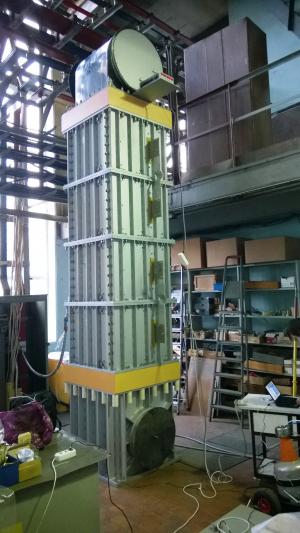Russia tests fast discharge resistor prototype
12 Jan 2015
-
Alexander Petrov, ITER Russia
Fast discharge resistors are made as a set of sections consisting of a resistive element enclosed in a steel casing. A 4.5-metre-tall prototype resistor was successfully tested in Russia in December.
In December 2014, Russian specialists at the Efremov Institute of Electrophysical Apparatus successfully tested a prototype of the fast discharge resistor module, designed to rapidly discharge energy stored in the coils of the ITER magnetic system. Tests results demonstrated full conformance with ITER Organization technical requirements.
The series of tests were conducted at the Efremov Institute within the framework of the Procurement Arrangement signed in 2011 for the Fast Discharge Units, Switching Networks, and the High-Current, Water-Cooled Busbars. Representatives of the ITER Organization and the Russian Domestic Agency were present.
The 4.5-tonne prototype resistor module is one of the key elements of the ITER magnet system, designed to protect the superconducting coils in the case of a sudden loss of superconductivity (a quench). Fast discharge resistors are made as a set of sections consisting of a resistive element enclosed in a steel casing. All in all, the Efremov Institute specialists will manufacture and deliver 1,030 sections (weighing 1,200 tonnes), capable of discharging 55 GJ of energy.
The series of tests were conducted at the Efremov Institute within the framework of the Procurement Arrangement signed in 2011 for the Fast Discharge Units, Switching Networks, and the High-Current, Water-Cooled Busbars. Representatives of the ITER Organization and the Russian Domestic Agency were present.
The 4.5-tonne prototype resistor module is one of the key elements of the ITER magnet system, designed to protect the superconducting coils in the case of a sudden loss of superconductivity (a quench). Fast discharge resistors are made as a set of sections consisting of a resistive element enclosed in a steel casing. All in all, the Efremov Institute specialists will manufacture and deliver 1,030 sections (weighing 1,200 tonnes), capable of discharging 55 GJ of energy.


